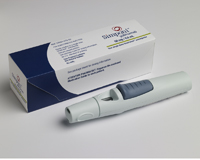Product
Simponi (golimumab)
Approval Date
April 24, 2009
Release Date
Currently available
Company
Centocor Ortho Biotech Inc.
Class
Anti-tumor necrosis factor (TNF)-alpha therapy.
Indication
In combination with methotrexate for the treatment of adult patients with moderately to severely active rheumatoid arthritis; alone or in combination with methotrexate for the treatment of adult patients with active psoriatic arthritis; for the treatment of adult patients with active ankylosing spondylitis.
Active Ingredient
Human monoclonal antibody
Agency Roster
Confidential
Marketing Strategy/Execution
The efficacy and safety of Simponi have been evaluated in one of the most comprehensive clinical development programs for an anti-TNF-alpha therapy, which included simultaneous studies in rheumatoid arthritis, psoriatic arthritis and ankylosing spondylitis. The program, which included more than 2,000 patients across five pivotal Phase 3 trials, served as the primary basis for FDA approval.
In March 2008, Centocor Ortho Biotech Inc. and Schering-Plough Corporation announced that a Marketing Authorization Application (MAA) had been submitted to the European Medicines Agency (EMEA) requesting the approval of golimumab as a monthly subcutaneous treatment for adults with rheumatoid arthritis, psoriatic arthritis and ankylosing spondylitis.Centocor Ortho Biotech Inc. developed and discovered Simponi and has exclusive marketing rights to the product in the United States. Following regulatory approval, Schering-Plough will assume exclusive marketing rights outside the United States except in Japan, Indonesia and Taiwan, where Simponi will be co-marketed by Mitsubishi Tanabe Pharma Corporation and Janssen Pharmaceutical Kabushiki Kaisha; Hong Kong, where Simponi will be exclusively marketed by Janssen-Cilag; and China, where Simponi will be exclusively marketed by Xian-Janssen.Physician Outlook
Simponi enters a crowded anti-TNF market with a convenience advantage of once-monthly self-injection administration. Its simultaneously approval of rheumatoid arthritis, active psoriatic arthritis and ankylosing spondylitis will ensure a more immediate rise in physician awareness and use. In the US, J&J Centocor will market both Simponi and the well established anti-TNF Remicade (IV administration). Any confusion among physicians on the appropriate patient types for these products should be easily managed by Centocor.
–Geoff Penney, Vice President, Research, GfK Healthcare
Also in the Pipeline (courtesy of Adis R&D Insight)
Drug: Lodotra
Manufacturer: Nitec Pharma/ Merck KGaA
Indication: Rheumatoid arthritis
Active ingredient: Controlled-release prednisone
Phase: Registered
Drug: CP-690
Manufacturer: Nitec Pharma/ Merck KGaA
Indication: Rheumatoid arthritis (In patients on background methotrexate)
Active ingredient: CP 690550
Phase: III
Drug: Naproxen/esomeprazole
Manufacturer: AstraZeneca
Indication: Ankylosing spondylitis
Active ingredient: Esomeprazole/naproxen
Phase: III
Drug: Arcoxia
Manufacturer: Merck & Co.
Indication: Ankylosing spondylitis
Active ingredient: Etoricoxib
Phase: Launched
Drug: COX 189
Manufacturer: Novartis
Indication: Osteoarthritis
Active ingredient: Lumiracoxib
Phase: Launched
Drug: 2nd Generation Anti-CD20
Manufacturer: Biogen Idec
Indication: Lupus nephritis
Active ingredient: Ocrelizumab
Phase: III
Drug: AT 001
Manufacturer: Adeona Pharmaceuticals
Indication: Rheumatoid arthritis
Active ingredient: Oral dnaJP1
Phase: III
Source: Wolters Kluwer HealthRecent MM&M Coverage
Product News
Company News
Pharmacology
Golimumab is a human IgG1k monoclonal antibody that is specific for human tumor necrosis factor alpha (TNFa). High levels of TNFa in the blood, synovial fluid, and joints have been linked to the pathophysiology of rheumatoid arthritis, psoriatic arthritis, and ankylosing spondylitis. The cytokine TNFa is a mediator in the development of inflammation in these chronic diseases. Golimumab binds to human TNFa, preventing it from interacting with its receptors and inhibiting its biological activity.
Clinical Trials
The efficacy and safety of golimumab in treating RA were evaluated in 3 placebo-controlled trials in adults with moderately to severely active disease. One study evaluated patients who were previously treated with one or more biologic TNF-blockers without a serious reaction; the second study evaluated patients who had active RA despite a stable dose of MTX =15mg/week and who had not been previously treated with a TNF blocker. The third study evaluated the use of golimumab in patients who were MTX-naive and had not previously been treated with a TNF blocker. The primary efficacy variable for the first two studies was the percent of patients achieving an American College of Rheumatology (ACR) 20 response at week 14; for the third study, it was the percentage of patients achieving an ACR 50 response at week 24. A greater percentage of patients treated with golimumab + MTX achieved ACR responses at week 14 (for the 1st and 2nd studies) and week 24 (for the 3rd study) compared to patients given MTX alone.
Patients with psoriatic arthritis and ankylosing spondylitis were also evaluated in clinical trials. Significant improvements in the signs and symptoms of each disease were seen amongst patients treated with golimumab.
Adverse Reactions
Inj site reactions, infections (may be serious), upper respiratory tract infection, nasopharyngitis, hypertension; rare: malignancies (eg, lymphoma), blood dyscrasias, new or worsening CHF, elevated liver enzymes, antibody formation.
Adults
50mg SC once monthly. Rotate sites.
Children
<18yrs: not recommended.
Contraindications
Detailed clinical information withheld for review by MPR’s clinical advisory board and will be added as soon as it becomes available.
Precautions
Increased risk of serious or fatal infections (eg, TB, bacterial sepsis, invasive fungal). Active infections: do not initiate therapy. Chronic or history of recurring or opportunistic infections. Conditions that predispose to infection. Travel to, or residence in, areas with endemic TB or mycoses. Test for and treat latent TB prior to initiating therapy. Monitor closely if new infection, reactivation of hepatitis B virus (HBV), or blood dyscrasias develop; discontinue if serious or opportunistic infection, sepsis, HBV reactivation, new or worsening CHF, or hematological abnormality (eg, cytopenias) develops. CHF (monitor). Immunosuppression. CNS demyelinating disorders. Malignancies. Latex allergy. Elderly. Pregnancy (Cat.B). Nursing mothers: not recommended.
Interactions
Concurrent abatacept, anakinra, live vaccines, or other TNF blockers: not recommended. Monitor CYP450 substrates with narrow therapeutic index.









